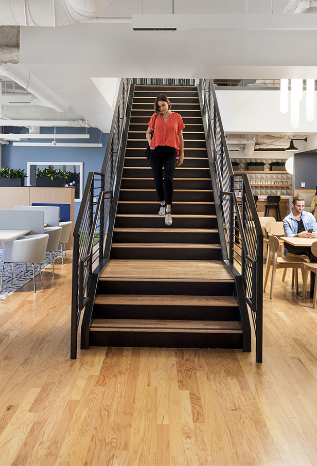Improving collaboration is high on the agenda for many organisations today, whether you’re embracing a traditional, hybrid or completely remote working model. But did you know your office space can have an impact on collaborative working? In fact, you can use your office space to improve it too.
In this blog, we’ll look at collaborative working and how office space and design can help improve and embrace collaborative working techniques.
What is collaborative working?
You might be reading this article thinking, what does collaborative working mean? And that’s before you even start to think about how you can improve it in your organisation.
In simple terms, collaborative working is the practice of working closely together to achieve a common goal, defined outcome or increased productivity. This could be two people, a team of people or even a whole workforce.
Why is collaborative working important?
Collaborative working is important in all organisations, for many different reasons, but mainly to bring employees together to reach a common goal. With more businesses operating remotely and from multiple locations with dispersed teams, it’s become more important than ever to ensure teams collaborate effectively and work together.
Benefits of collaborative working
We’ve already mentioned that collaborative working is important for bringing teams together and helping individuals to work towards a shared outcome. Here are some more reasons why collaborative working is beneficial in the workplace of today.
Opportunities for skill-sharing
If you have a diverse workforce with a range of different skills, it can sometimes mean that you’re limited to the knowledge and skill set of one person to complete a specific task. However, by encouraging collaboration between teams and individuals, you can provide an environment for knowledge-sharing and the opportunity for your staff to learn from one another’s experiences.
This can have a positive impact on your bottom line too, with one study showing that connected teams demonstrate a 21% increase in profitability.
Learning is a key aspect of anyone’s professional development, but especially when you’re hiring, with 87% of millennials believing learning and development in the workplace is important. Collaborative working is a great way to embed a culture of openness with a shared knowledge base that enables employees to continue their learning experience.
Problem-solving
Making it easy for employees to collaborate can help them to problem-solve much more efficiently. Knowing who to call upon for help with a specific project ensures employees feel supported and comfortable working with others. In turn, this makes for faster project completions with improved productivity.
Improved efficiency
Just like how collaboration helps to solve problems, it can also help to improve efficiencies in the workplace, especially on large or complex projects. With collaborative working environments, employees can easily work together to divide and conquer on a project rather than spend more time working on it alone, helping to drive efficiency and complete tasks quicker.
Connecting people and departments
If specific people or departments rarely come into contact with other teams, you could benefit from embracing a more collaborative working environment. By encouraging collaboration across teams, you can connect departments and develop mixed-skills teams that work together on key projects, allowing employees to work with people outside of their normal job while achieving a common goal.
This also helps them develop relationships with new people who might become part of their social circle, increasing positive emotions and leading to better morality in the workplace.
Morale boosting
A study by Zippia recently found that employees who work for collaborative companies are 22% more likely to believe their employer cares about their morale. By breaking down walls in your organisation and enabling collaboration, you can make it easier for people to trust each other and feel comfortable working together naturally. This can directly impact the morale of your entire business, making for better efficiencies, improved retention, and higher productivity levels.
RELATED: Work Environments Proven to Increase Employee Retention
How office space impacts collaborative working
Whether your employees work from a private office owned by the company, flexible office space or remotely, the office space and environment can have a big impact on collaborative working. It’s important to think about the design and layout of your office to ensure it’s set up for collaborative working.
For example, if your employees work in siloed cubicles, your workplace is unlikely to breed a collaborative working environment. On the other hand, large open spaces or hot desks where employees can see each other and quickly nip over to someone’s desk are much more likely to have a culture of collaboration.
Improving collaboration with your office space
There are several ways to improve collaboration in your office space, regardless of whether you’re transforming your current location or seeking office space for rent built for collaboration. Here are some of our top tips:
Make it easy to collaborate
The first thing you can do to create a more collaborative working environment is to make it easy for employees to collaborate. Remove walls that create natural barriers and provide open spaces that foster collaboration. Simply making people more visible helps employees feel more comfortable approaching the people they need without them making too much effort.
If your company has opted for a serviced office space, you will typically find that many of these are open-plan, making it easier for employees to collaborate and communicate.
If you don’t have a fully open-plan office, try to use other spaces and create areas specifically for collaboration. You could utilise meeting rooms or create ‘brainstorming’ areas for group work, but make sure the space is big enough when in use!
Decorate to inspire
Office decoration can also impact collaboration and whether your employees feel like their workspace nurtures inspiration and creativity. You should ensure there is plenty of natural light in your main collaboration spaces to make people feel more alert and productive.
Colour is also important when decorating your office, with different colours thought to promote different feelings and moods. For example, the colour green is associated with nature and feelings of balance, motivation and growth, making it a great choice for your office if you aim to promote creativity and collaboration. You could use green paint here or even add plants to the office to bring some green into the space.
RELATED: Benefits of Plants in the Office
You could also turn to companies with great collaborative working examples and look at how their environment has been designed to encourage close working. Innovative tech companies like Google and Twitter are renowned for their bright and wacky workspaces that have been designed to inspire collaboration and creativity.
Provide space for privacy
While an open-plan is key for collaboration in most cases, it’s also important to provide areas where people can work quietly. A lack of privacy in the office can sometimes discourage collaboration if people feel like they don’t have a space to focus without distraction.
A Harvard Business Review study found that conversations between employees in an open-plan office can be shorter than those in traditional office environments, demonstrating the importance of smaller spaces that enable deeper conversations and more focused work.
Spaces for privacy can be in the form of single desks away from collaborative areas, quiet zones or private booths. These spaces can also promote collaborative working in smaller focus groups where quieter space is needed away from the main office.
Paving the way for collaboration
Whether you’re looking for an office for rent or you’ve already got an office space, we hope this guide has helped you understand ways to make your space more collaborative. If you’re searching for an office to let, browse the Easy Offices list of locations to find a collaborative working space that suits your business.

